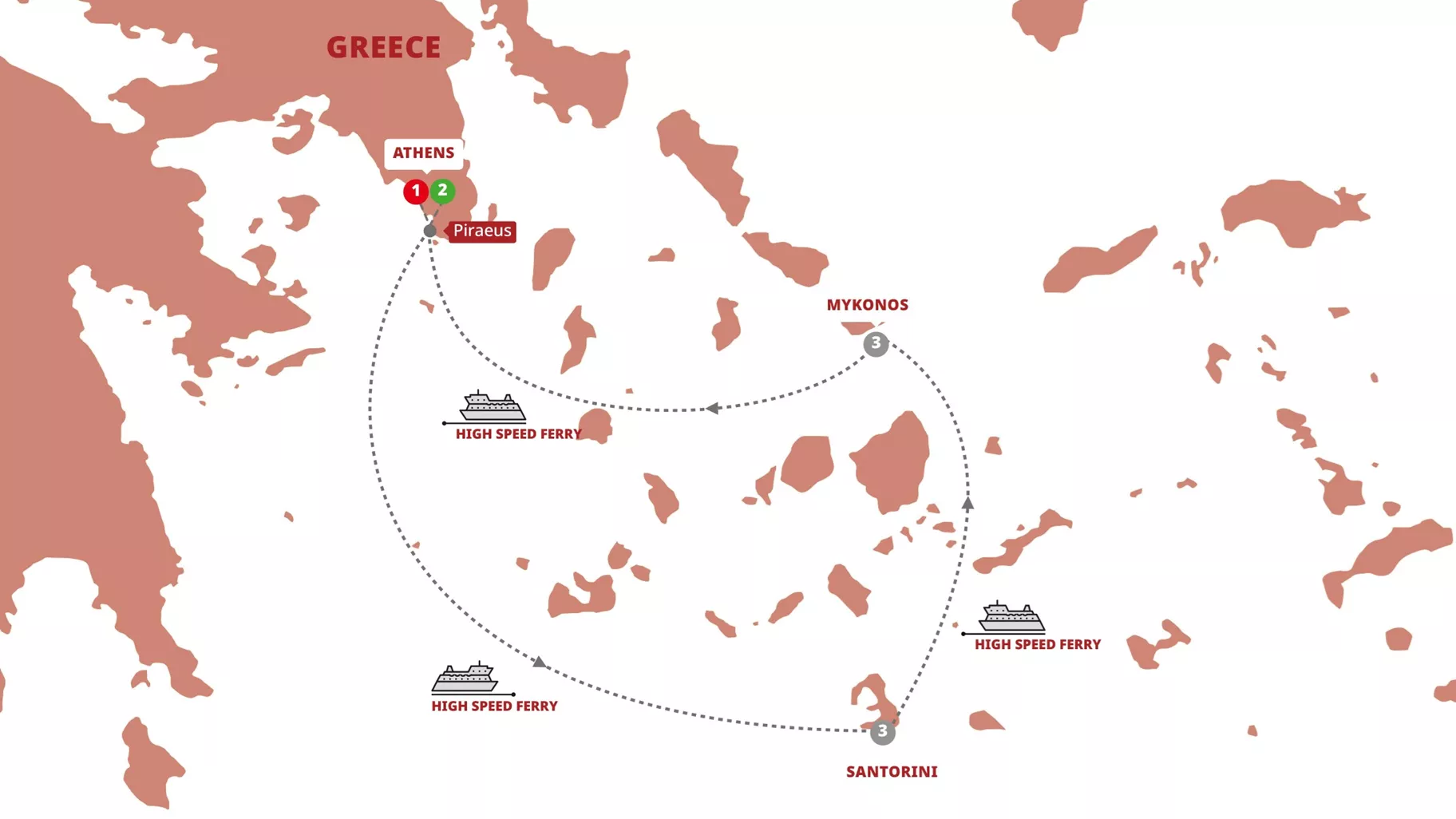
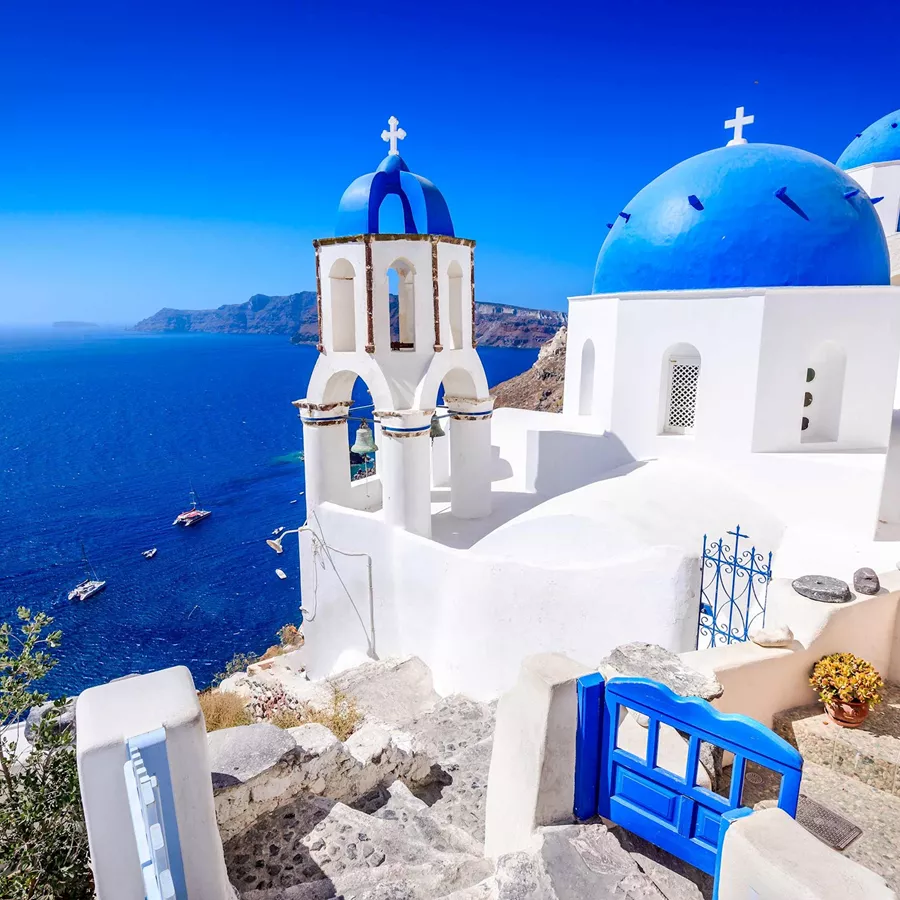
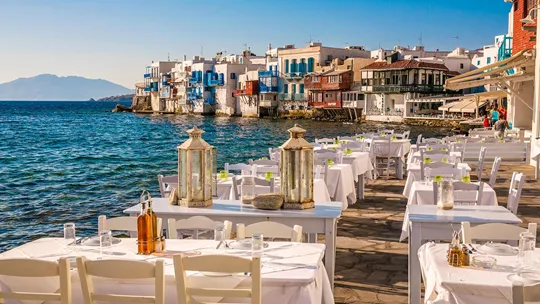

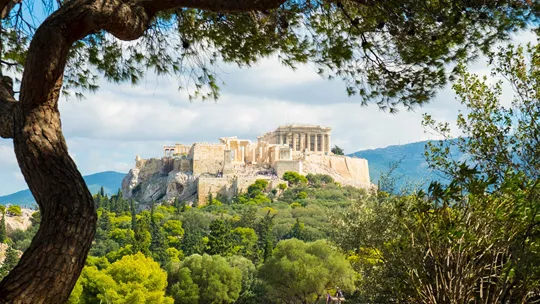
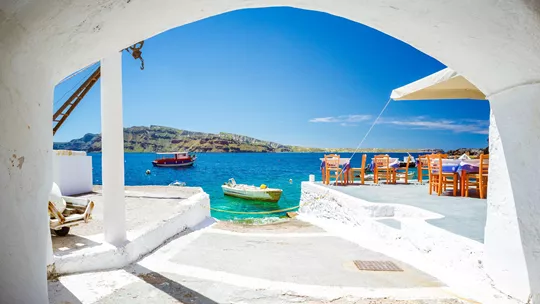

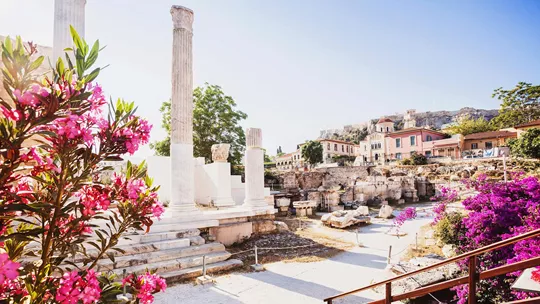
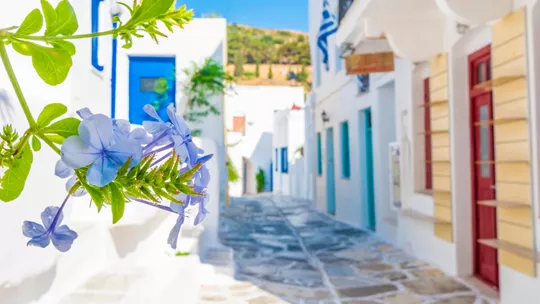

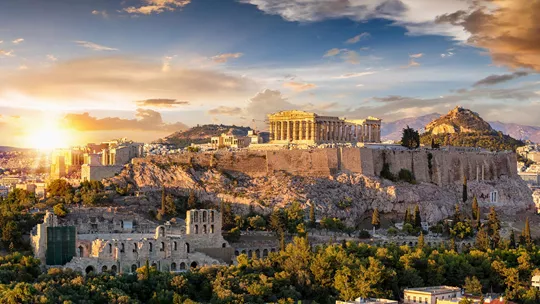
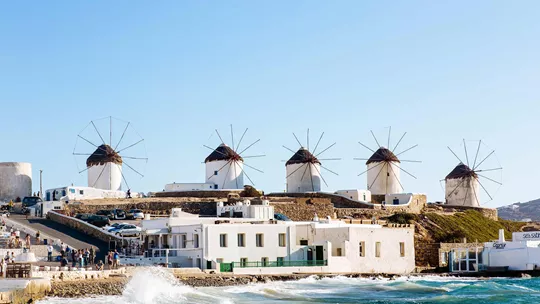
The Acropolis: Dominating the skyline of Athens, the Acropolis is one of the world’s most iconic historical sites. The Parthenon, a symbol of ancient Greece and democracy, stands proudly at the top, while the Temple of Athena Nike and the Erechtheion showcase the intricate beauty of ancient Greek architecture.
Acropolis Museum: At the foot of the Acropolis, the Acropolis Museum houses countless artifacts from ancient Greece, offering insights into the country’s rich history.
Plaka and Monastiraki: The old neighborhood of Plaka with its narrow cobblestone streets is perfect for wandering, filled with traditional shops, cafes, and tavernas. Nearby, Monastiraki Square is a lively market area with a mix of modern and ancient charm, offering everything from antiques to street food.
Santorini: Famous for its breathtaking sunsets, white-washed buildings, and blue-domed churches, Santorini is a postcard-perfect island in the Cyclades. The cliffs overlooking the caldera offer some of the most iconic views in the world. Oia, in particular, is renowned for its romantic sunsets. Explore the volcanic beaches, traditional villages, and enjoy local wines.
Mykonos: Known for its lively nightlife, Mykonos is a party destination as well as a beautiful island with sandy beaches, charming streets, and classic Greek windmills. Whether you're lounging on the beaches by day or dancing at world-class clubs by night, Mykonos offers an energetic vibe.
Crete: The largest Greek island, Crete is rich in history, offering ancient ruins like the Palace of Knossos, beautiful beaches like Elafonissi, and picturesque mountain villages. The island is also known for its delicious food, including Cretan cheese and olive oil.
Rhodes: Located in the Dodecanese islands, Rhodes is steeped in medieval history, with the Palace of the Grand Master and the ancient city of Lindos. The island also offers beautiful beaches and charming cobblestone streets.
Ancient Olympia: The birthplace of the Olympic Games, Ancient Olympia is a must-visit for history buffs. The site includes ruins of ancient athletic training grounds, temples, and the Temple of Zeus, where the Olympic flame is still lit today.
Mycenae: Step back in time to Mycenae, the home of King Agamemnon and one of the most important archaeological sites in Greece. Explore the Lion Gate, the Treasury of Atreus, and the ancient tombs that tell the story of one of Greece’s greatest civilizations.
Nafplio: A charming coastal town in the Peloponnese, Nafplio features a combination of Venetian, Ottoman, and Greek influences. Visit the impressive Palamidi Fortress, enjoy the seaside promenade, and wander through the charming old town.
Meteora Monasteries: The UNESCO-listed Meteora is one of Greece’s most awe-inspiring natural wonders. The giant rock formations rise dramatically from the valley floor and are home to ancient monasteries perched atop them. The monasteries are not only a spiritual experience but also offer stunning views and hiking opportunities through the surrounding landscape.
Corfu: Corfu offers a mix of Venetian, French, and British influences in its architecture and culture. Explore the Corfu Old Town, a UNESCO World Heritage site, and enjoy the island's green hills, picturesque beaches, and crystal-clear waters.
Zakynthos (Zante): Famous for the iconic Navagio Beach (Shipwreck Beach), with its white sand and turquoise waters, Zakynthos also offers impressive caves, like the Blue Caves, and a chance to spot Caretta Caretta turtles.
Kefalonia: Known for its rugged landscapes, Kefalonia is home to some of Greece’s most beautiful beaches, like Myrtos Beach. Visit the Melissani Cave and enjoy traditional Greek hospitality in the quaint villages.
Greek Cuisine: Greek food is a delightful part of the travel experience. From fresh seafood to hearty stews, moussaka, and souvlaki, there is something for everyone. Don’t forget to try baklava, loukoumades, and local cheeses like feta and kefalotyri.
Greek Wine and Olive Oil: Greece is one of the oldest wine-producing countries, and visiting local wineries to taste wines like Assyrtiko (from Santorini) and Agiorgitiko (from Nemea) is a must. Greek olive oil is world-renowned, and many villages offer tours of their olive groves and presses.
Festivals: Greece is known for its lively festivals, such as the Athens & Epidaurus Festival, which celebrates classical theater, dance, and music, or the Thessaloniki International Film Festival. Carnival (Karnavali) is another colorful and vibrant celebration that takes place in different regions.
Mount Olympus: The home of the ancient Greek gods, Mount Olympus is a favorite for hikers and nature lovers. The mountain offers stunning views, diverse wildlife, and various trails for all levels of hikers.
Lake Plastira: Located in central Greece, Lake Plastira is a picturesque artificial lake surrounded by lush forests and mountains. It’s ideal for outdoor activities like kayaking, cycling, and hiking.
Samaria Gorge: On the island of Crete, the Samaria Gorge is one of Europe’s longest gorges. It’s a beautiful 16-kilometer hike through rugged terrain, offering spectacular views, rare wildlife, and a chance to visit the abandoned village of Samaria.
Best Time to Visit: The best time to visit Greece is during the shoulder seasons—from April to June and September to October—when the weather is pleasant, and the crowds are smaller. Summer (July and August) is peak season, especially on the islands, so expect higher prices and larger crowds.
Language: Greek is the official language, but English is widely spoken in tourist areas. Learning a few basic Greek phrases can be appreciated by locals.
Currency: Greece uses the Euro (€). Credit cards are accepted in most places, but it’s good to carry cash for small purchases, especially on the islands or in more remote areas.
Transportation: Greece has a well-developed transportation system, including ferries between the islands, buses, and domestic flights. Renting a car is a great way to explore more rural or less accessible areas, like the Peloponnese or mainland Greece.
Greece is a land of contrasts—where ancient ruins coexist with vibrant cities, stunning beaches meet rugged mountains, and time-honored traditions blend seamlessly with modern life. Whether you're exploring the historical wonders of Athens, relaxing on the beaches of Mykonos, hiking the cliffs of Meteora, or tasting the rich flavors of Greek cuisine, Greece offers a diverse and unforgettable experience. With its unparalleled history, beautiful landscapes, and warm hospitality, it’s no wonder that Greece remains one of the most popular travel destinations in the world.

Subscribe to see secret deals prices drop the moment you sign up!